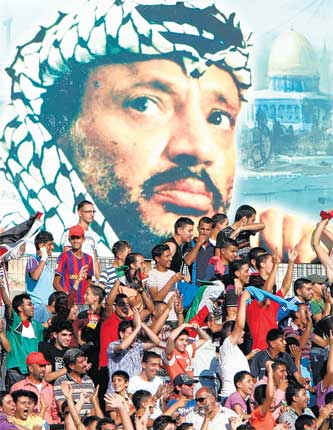Afghans' road to Brazil riven with potholes
Politics almost derailed their World Cup qualifier in Palestine today and getting there was nightmare

If the route to their World Cup first-round preliminary qualifier against Palestine today is anything to go by, the road to 2014 will be long for the young hopefuls of the Afghan national football team. Starting early on Friday, they left their training base in Kabul and criss-crossed West Asia on a journey that they hope will take them to Brazil in three years' time.
"We left Kabul and flew to Dubai, then Delhi, on to Amman, and now we are here," the Afghanistan captain, Israfeel Kohistani, said yesterday afternoon. "Here" was a neon-lit Israeli waiting-room at the Allenby Bridge crossing between Jordan and the Occupied Territories.
Despite the intervention of the Jordanian government and the Palestinian Authority, the Israelis saw fit to detain the team for an hour – one final and unnecessary chapter on their epic journey. Finally the tired players arrived at Ramallah's Caesar Hotel, just 22 hours before kick-off, and went straight to an open training session.
Kohistani, along with six of his national team-mates, plays for Kabul Bank in the Afghan Premier League, one of the wealthier clubs. He says the standard there is improving,and they have been helped by the introduction of artificial pitches.
Afghanistan lie 166th in the Fifa rankings, wedged between Chinese Taipei and Burma. Despite it being their highest ranking and the team becoming stronger, Kohistani says locals are impatient for success. "Afghanistan is a new team in world football, but they get angry when we lose. This is not good for us.
"Of course we feel duty-bound to give people a lift given the situation. We are trying to be a good team."
Last week's stopover in Kabul was the first time a number of the national squad had stepped on Afghan soil, drawn as they are from the Afghan refugee diaspora. The star is the US-based Mohammad Yusef Mashriqi, who is affiliated to the reborn New York Cosmosteam, currently vying for an MLS franchise. Others in the squad play in the lower leagues of Swedish and German football.
Every step of the way has been fraught with complications for the Afghan squad, and for an uneasy period last week it was feared that the game might not take place. Hamid Karzai's government were understood to be unhappy with the match, suggesting that recognition of Palestine's national team would be de facto recognition of Israel – surely one of the more perverse arguments in sports politics.
Palestine took the first leg 2-0 last Wednesday in neutral Tajikistan, Kabul being deemed too dangerous for a Fifa-sanctioned match.
For the Palestinians too, the game assumes great importance. Thirteen years after their admission into Fifa (virtually Sepp Blatter's first act as president), Palestine are finally playing their first World Cup match on home soil. As the country inches towards a declaration of statehood, the apparatus of a nation state assumes huge importance, and football is a hugely powerful symbol. The Palestinians' idea is the more state institutions they possess, the more irresistible their case to the world becomes.
"It's primarily a matter of sports justice. In the Fifa statutes since the start of time, they insist that every team has a right to play at home," says Jérôme Champagne, an advisor to the Palestinian FA and Olympic Committee and one-time aide to Blatter. In March the Olympic team played a London 2012 qualifier here, and afterwards the Asian Football Confederation president, Mohamed bin Hammam, pledged that all of Palestine's club and international matchesunder their jurisdiction would be played on home soil.
But despite these inroads, complications hinder progress. The 50ft-high "Peace Wall" stands just yards away from the 12,000 capacity Al-Ram Stadium, a permanent reminder that this remains one of the most volatile places on earth. During Israel's 2007 West Bank incursions they used the stadium to park their tanks.
For the Olympic qualifier a score of players were prevented by the Israelis from crossing between Gaza and the West Bank. IOC mediation has since eased some of these impediments, but problems remain. On Friday Roberto Bishara, a Chilean-based Palestinian international, and the centre-back Omar Jarun were held at the border with Jordan for four and six hours respectively.
But despite the difficulties facing these two international football minnows there remains a match to be played this afternoon, with a second preliminary round against Thailand awaiting the winner in three weeks.
"We have come here to beat Palestine," says Kohistani. "We need three goals, so it's tough. But I respect and trust my team to beat Palestine."
Join our commenting forum
Join thought-provoking conversations, follow other Independent readers and see their replies
Comments